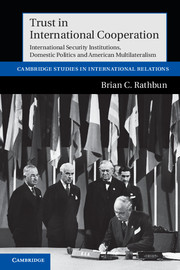 Trust in International Cooperation
Trust in International Cooperation Book contents
- Frontmatter
- Contents
- Preface
- 1 Circles of trust: reciprocity, community and multilateralism
- 2 Anarchical social capital: a social psychological theory of trust, international cooperation and institutional design
- 3 The open circle: the failure of the League of Nations
- 4 Squaring the circle: the birth of the United Nations
- 5 Closing the circle: the negotiation of the North Atlantic Treaty
- 6 Coming full circle: fear, terrorism and the future of American multilateralism
- Works cited
- Index
6 - Coming full circle: fear, terrorism and the future of American multilateralism
Published online by Cambridge University Press: 05 June 2012
- Frontmatter
- Contents
- Preface
- 1 Circles of trust: reciprocity, community and multilateralism
- 2 Anarchical social capital: a social psychological theory of trust, international cooperation and institutional design
- 3 The open circle: the failure of the League of Nations
- 4 Squaring the circle: the birth of the United Nations
- 5 Closing the circle: the negotiation of the North Atlantic Treaty
- 6 Coming full circle: fear, terrorism and the future of American multilateralism
- Works cited
- Index
Summary
Generalized trust served as a crucial ingredient in the United States’ postwar program of multilateralism. It is necessary to explain many of the features of international security institutions, and the very creation of the organizations themselves. What does the social psychological argument offered in previous chapters have to tell us about American foreign policy today, particularly in light of the frequent declaration that the bipartisan pillar of multilateralism is now crumbling? In this chapter, I come full circle to consider the contemporary issues raised in this book's opening pages.
Just as many claimed that the lessons of WWII led to a fundamental shift in American foreign policy, some today argue that the terrorist attacks on New York and Washington led to a striking reorientation in America's approach to international relations. Most deftly, Hemmer (2007) argues that the “lessons of 9/11” are to remain hyper-vigilant to the possibility of terrorism and to disrupt and preempt attacks before they come to fruition. Crudely stated, 9/11 is the new Pearl Harbor. And just like that surprise attack, 9/11 is said to have led to a lasting structural shift in the political spectrum as a whole. Democrats and Republicans alike have committed to restrictions on civil liberties at home and to the war on terror abroad. Hemmer's claims bear a striking resemblance to those offered by Legro (2005) on how external events affected American grand strategy after Pearl Harbor and fostered the creation of a bipartisan consensus.
- Type
- Chapter
- Information
- Trust in International CooperationInternational Security Institutions, Domestic Politics and American Multilateralism, pp. 209 - 228Publisher: Cambridge University PressPrint publication year: 2011


